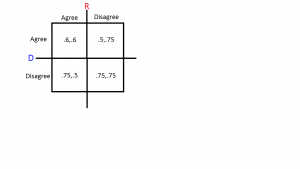The Not So Fun Game Of Political Gridlock
Political Gridlock and Game Theory
If you’ve been paying attention to politics over the last four years you would know it has been an unfortunate story of government gridlock on some of the most important issues including immigration, federal debt, gay rights, entitlement reform and so much more. What few political accomplishments have come to fruition over the past four years have largely been the result of executive orders, Supreme Court decisions, or last minute agreements. So with election day exactly two months away and the two major party candidates seemingly further apart than ever before, is there any hope for the next four years to be better than the last?
Unfortunately, when you look at the situation we find ourselves in through the lens of game theory, our prospects look grim. This article written by Mohamed A. El-Arian for the Atlantic, focuses specifically on the game theory explanation for the fiscal ceiling crisis in 2013, but can be more broadly applied to almost all issues in congress and the senate at this point. El-Arian’s argument basically boils down to the fact that political gridlock is the Nash Equlibrium that is naturally reached based on the current incentive structure and power dynamics in Washington. El-Arian argues that the congressional game, which is based around local reelection incentives is not properly designed to ensure that the national interests are represented by congress.
The problem politicians face can be illustrated by the game payout chart below. If Republicans and democrats choose to both agree, they will get something done so they’re local voters will be inclined to vote for them. However, at the same time, local political rivals of the same party can attack them for working with the “enemy”. This ultimately means that while their chances of getting reelected are better than 50/50 they are worse than if they had chosen to just disagree with their opponents, and explain to their local constituents that the political gridlock was the other party’s fault. This leads to a Nash Equilibrium of both parties disagreeing with one another. Without a super majority in both the house and senate neither party can pass any bill with mutual disagreement. This means the current game is almost certain to always result in political stagnation.
So what can be done to end the gridlock? Ultimately the answer is we have to change the game. Only time will tell if the solution is adding a new player (Garry Johnson For President!!!), changing local election systems, or adding new incentives for cooperation. All we can say for certain is that if we keep playing the same game, we’re likely to get the same results.

